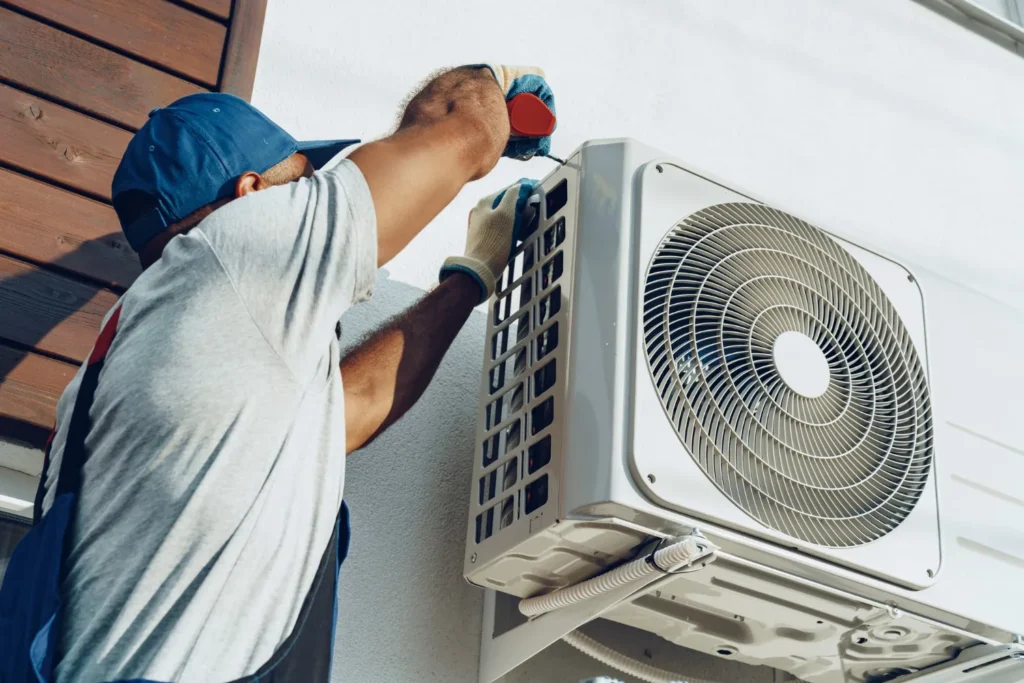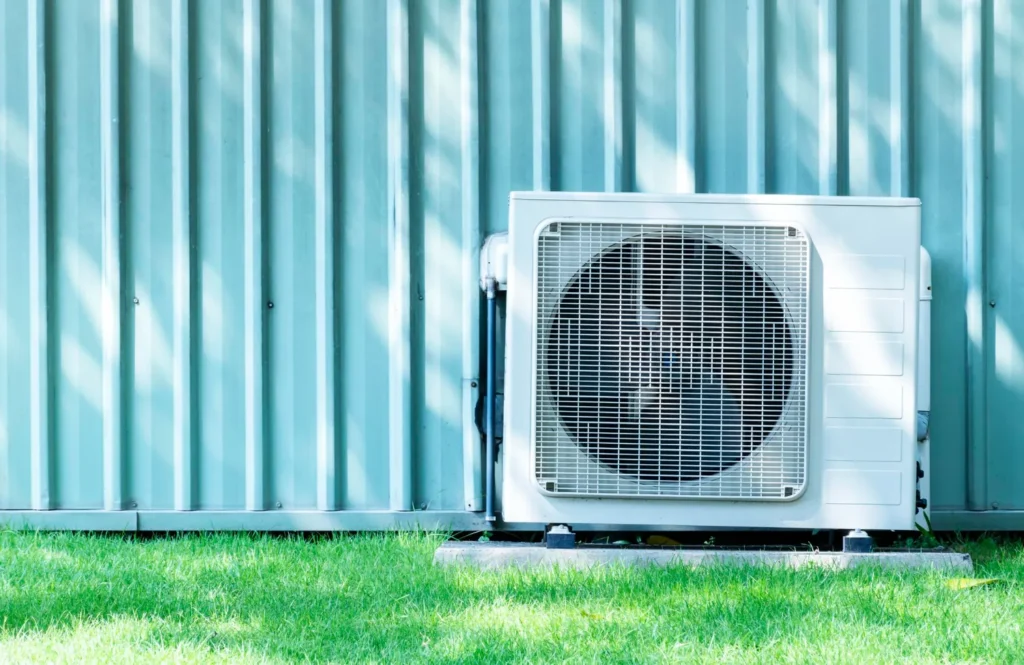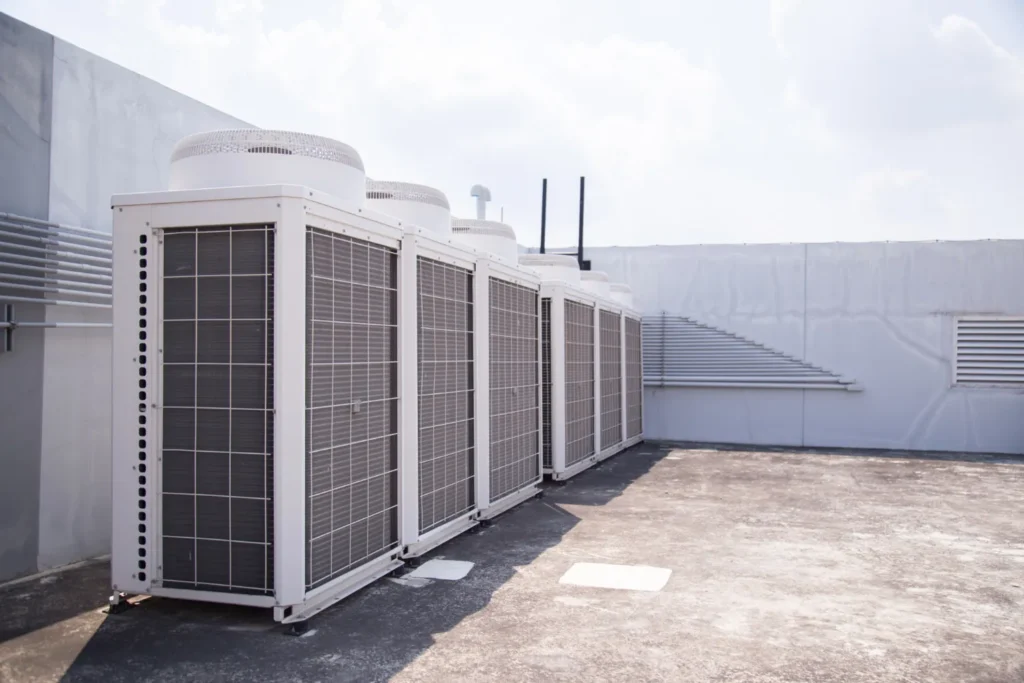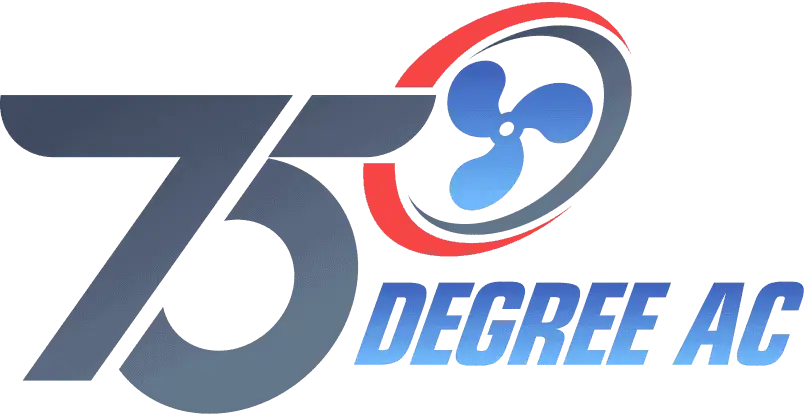Curious about how much to install central air? In our guide, we’ll break down the numbers behind HVAC installation costs. From understanding the factors influencing expenses to navigating budget considerations, we’ve got you covered.
Whether you’re planning a home upgrade or simply exploring your options, we’ll provide valuable insights to help you make informed decisions. Ready to crunch the numbers and discover the secrets to how much to install central air? Let’s dive in!
Table of Contents
ToggleWhat Is Central Air Conditioning?
Central air conditioning is a sophisticated cooling system designed to regulate indoor temperatures by distributing cool air throughout a building via a network of ducts and vents. Unlike window units or portable air conditioners, central air conditioning provides uniform cooling across every room, ensuring consistent comfort levels throughout the entire space.
This system comprises an outdoor unit containing a compressor and condenser coil, which extracts heat from the indoor air, and an indoor unit housing an evaporator coil and air handler, which circulates cooled air back into the living areas.
How Much To Install Central Air Conditioning In Katy?

Answer to the How Much To Install Central Air Conditioning In Katy involves several components, each contributing to the overall cost. Understanding these factors is essential for estimating the total expense and budgeting accordingly. Factors that influence central air installation costs include unit size, compressor type, home size, home type, unit efficiency, brand, labor costs, permits, electrical upgrades, and optional features.
By considering these factors and obtaining quotes from reputable HVAC contractors, homeowners can make informed decisions and ensure a successful central air installation process.
Factors That Influence Central Air Installation Cost
Several factors influence – How much to install central air conditioning:
By Unit Size
The size of the central AC unit plays a significant role in determining how much does it cost to install central air. Larger units require more materials and labor for installation, resulting in higher upfront expenses. When selecting a unit size, it’s essential to consider factors such as the square footage of your home and the cooling capacity needed to maintain comfortable indoor temperatures.
By Compressor Type
The type of compressor used in the central AC system also influences how much to install central air conditioning. Single-stage compressors are typically more affordable upfront but may have lower efficiency ratings. Two-stage or variable-speed compressors, while more expensive initially, can offer better energy efficiency and performance, potentially leading to long-term savings on energy bills. Consider your budget and energy efficiency goals when choosing the compressor type for your central AC system.
By Home Size
The size of your home directly impacts how much is it to install central air. Larger homes require more extensive ductwork and may need multiple units to cool the space, resulting in higher installation costs adequately.
Additionally, larger homes often have higher cooling demands, requiring more extensive and more powerful central AC units, which can also contribute to increased expenses. Conversely, smaller homes may have more straightforward installation requirements and lower overall costs.
By Home Type
Different types of homes may have varying how much to install central air conditioning. For example, multi-story homes typically require more complex ductwork and may need additional equipment, such as zone control systems, to ensure even cooling throughout the entire space.
Conversely, single-story homes may have more straightforward installation requirements, resulting in lower overall costs. Factors such as the layout, design, and construction of your home can all influence the total cost of central AC installation.
By Unit Efficiency
The energy efficiency rating (SEER) of the central AC unit is another significant factor affecting how much to install central air conditioning. High-efficiency units may cost more upfront but can result in lower long-term energy expenses.
When selecting a central AC unit, consider the SEER rating and weigh the upfront cost against potential energy savings over time. Additionally, some utility companies offer rebates or incentives for installing high-efficiency HVAC systems, which can help offset the initial investment.
By Brand
The brand of central AC unit you choose can also impact how much to install central air conditioning. Different brands offer units at varying price points, with some higher-end brands commanding premium prices for their reputation, advanced features, and warranties.
While these high-end brands may provide superior performance and durability, they often come with a higher upfront cost for both the unit and installation. On the other hand, budget-friendly brands may offer more affordable options, but they may need more advanced features and longevity than their higher-priced counterparts.
When considering brands, it’s essential to balance upfront costs with long-term performance and reliability to ensure you get the best value for your investment. Additionally, reputable brands may offer better customer support and warranty coverage, which can provide peace of mind and potentially reduce long-term maintenance costs.
Labor Cost – How Much To Install Central Air Unit

In addition to the cost of the central AC unit itself, you’ll need to consider labor costs for installation. Labor expenses can vary depending on factors such as the complexity of the installation, local labor rates, and any additional services required. HVAC technicians typically charge by the hour or provide a flat-rate quote for the entire installation process.
It’s essential to obtain multiple quotes from reputable contractors to compare prices and ensure you’re getting a fair deal. Additionally, consider the experience and qualifications of the HVAC technician, as a skilled professional may charge higher rates but can ensure a quality installation that maximizes the efficiency and longevity of your central AC system.
Additional Costs and Considerations Associated With How Much To Install Central Air
In addition to the upfront cost of How Much To Install Central Air, there may be additional expenses and considerations to keep in mind. These can include:
- Ductwork modifications: If your home’s existing ductwork is inadequate or requires repairs, additional costs may be incurred to modify or replace ducts to ensure proper airflow and cooling.
- Permits: Depending on local regulations, you may need to obtain licenses for central AC installation, which can add to the overall cost.
- Electrical upgrades: Central AC units require a dedicated electrical circuit, and older homes may need electrical upgrades to accommodate the increased power demand.
- Optional features: Optional features such as zoning systems, smart thermostats, or air purification systems can enhance comfort and indoor air quality but come with additional costs.
- Maintenance: Regular maintenance is essential for keeping your central AC unit running smoothly and efficiently. Factor in the cost of routine maintenance tasks such as cleaning coils, changing filters, and scheduling professional tune-ups to ensure optimal performance and longevity of your system.
How To Keep Central AC Unit Maintenance Costs Down?
Regular maintenance is crucial for keeping your central AC unit running smoothly and efficiently while minimizing maintenance costs. Here are some tips to help you keep maintenance costs down:
- Change air filters regularly: Dirty air filters restrict airflow and force your central AC unit to work harder, increasing energy consumption and wear and tear. Replace air filters every 1-3 months or as recommended by the manufacturer.
- Clean outdoor unit: Keep the outdoor unit free of debris such as leaves, grass clippings, and dirt to ensure proper airflow and efficient operation. Use a garden hose to rinse away dirt and debris as needed gently.
- Schedule professional tune-ups: Regular tune-ups by a qualified HVAC technician can identify and address minor issues before they escalate into costly repairs. Schedule annual maintenance visits to keep your central AC unit in top condition.
- Invest in a programmable thermostat: A programmable thermostat allows you to set temperature schedules based on your daily routine, optimizing energy usage and reducing cooling costs.
- Address issues promptly: If you notice any unusual noises, odors, or performance issues with your central AC unit, don’t ignore them. Promptly address any problems to prevent further damage and avoid costly repairs down the road.
5 Ways To Save Money On Air Conditioning Installation

Are you looking to save money on air conditioning installation? Here are five tips to help you minimize costs:
- Shop around for quotes: Obtain estimates from multiple reputable HVAC contractors to compare prices and services. Feel free to negotiate with contractors to secure discounts or special deals.
- Consider energy efficiency: Invest in a high-efficiency central AC unit to reduce long-term energy expenses. While high-efficiency units may cost more upfront, they can lead to significant savings on your utility bills over time.
- Leverage rebates and incentives: Many utility companies offer incentives for installing energy-efficient HVAC systems. Check with your local utility provider to see if you qualify for any rebates or incentives that can help offset the cost of central AC installation.
- Schedule off-season installation: Consider scheduling central AC installation during the off-season, such as in the spring or fall, when HVAC contractors may offer discounts or promotions to fill their schedules.
- Explore financing options: If upfront costs are a concern, explore financing options such as HVAC financing programs or personal loans to spread the cost of central AC installation over time.
FAQ More About How Much to Install Central Air
Have questions about how much to install central air? Here are answers to some frequently asked questions:
Is it worth adding central air to a house?
Adding central air conditioning can enhance comfort and property value, making it a worthwhile investment for many homeowners. Central air conditioning provides consistent cooling throughout the entire home, unlike window units or portable air conditioners, which may only cool specific areas.
Additionally, central AC can improve indoor air quality by filtering out airborne pollutants and allergens, creating a healthier living environment. While the upfront cost of central AC installation may seem significant, the long-term benefits in terms of comfort, convenience, and energy savings often outweigh the initial investment.
Is it Expensive to Convert to Central Air?
Converting to central air conditioning can vary in cost depending on factors such as the size of your home, existing ductwork, and desired features. While the upfront cost may seem significant, central air conditioning offers long-term benefits such as improved comfort, energy efficiency, and property value.
It’s essential to consider the potential return on investment and weigh it against the initial expense. Additionally, financing options and potential energy savings can offset the cost of converting to central air conditioning, making it a viable option for many homeowners.
How Much Does it Cost to Install Centralized AC?
The cost of installing centralized AC varies based on factors such as home size, unit efficiency, labor costs, and additional considerations. On average, homeowners can expect to pay several thousand dollars for central AC installation.
It’s essential to obtain multiple quotes from reputable HVAC contractors to compare prices and ensure you’re getting a fair deal. Additionally, consider factors such as unit size, compressor type, and brand when selecting a central AC unit to ensure it meets your cooling needs and budget requirements.
How Hard is it to Add Central Air to a House?
Adding central air conditioning to a house can vary in difficulty depending on factors such as the layout of the home, existing ductwork, and electrical infrastructure. In some cases, homes already have the necessary components in place, making installation relatively straightforward.
However, for homes without existing ductwork or suitable space for duct installation, adding central air conditioning may require more extensive modifications, increasing the complexity and cost of the project. It’s essential to consult with a qualified HVAC contractor to assess your home’s suitability for central AC installation and determine the best approach to meet your cooling needs.
How much does it typically cost to install a central air conditioning system for a 2,000 square feet home?
The HVAC installation cost for a central air conditioning system in a 2,000 square feet home varies based on factors like the SEER rating of the unit, any necessary ductwork modifications, and additional features. On average, homeowners can expect to pay between $3,000 to $7,000.
What factors influence the HVAC installation cost when replacing an old HVAC system with central air conditioning?
When replacing an old HVAC system with central air conditioning, factors such as the size of the home, existing ductwork condition, SEER rating of the new unit, and any necessary upgrades impact the installation cost. Professional assessment ensures an accurate estimate.
How do I calculate the HVAC installation cost for installing central air conditioning in my home?
To estimate the how much to install central air, consider factors like square footage, SEER rating preferences, ductwork requirements, and additional features. Consulting with HVAC professionals ensures accurate cost calculations.
Can I install air conditioning units myself to save on HVAC installation cost?
While DIY installation may seem cost-effective, it’s not recommended for central air conditioning systems due to complexity and safety concerns. Professional HVAC installation ensures proper unit sizing, ductwork installation, and compliance with regulations.
What is the average HVAC installation cost for a central air conditioning system with a SEER rating of 16?
The average HVAC installation cost for a central air conditioning system with a SEER rating of 16 varies based on factors like home size and existing ductwork condition. On average, homeowners can expect to pay between $4,000 to $9,000 for installation.
Can Any House be Converted to Central Air?
While many homes can be converted to central air conditioning, some factors may impact the feasibility and cost of the conversion. Homes with existing ductwork and sufficient space for indoor and outdoor AC units are typically the easiest to convert to central air conditioning.
However, homes without existing ductwork may require additional modifications, such as installing ducts or opting for ductless mini-split systems. Additionally, older homes with outdated electrical systems may need electrical upgrades to accommodate the increased power demand of central AC units. It’s essential to consult with an experienced HVAC contractor to assess your home’s suitability for central air conditioning and determine the best solution for your cooling needs and how much to install central air.
Bottom Line On How Much To Install Central Air
In conclusion, How much to install central air can vary widely based on factors such as unit size, compressor type, home size, unit efficiency, brand, labor costs, and additional considerations. While the upfront investment may seem significant, central AC can provide long-term comfort and energy savings, making it a worthwhile investment for many homeowners.
By understanding the factors that influence installation costs and carefully planning your budget, you can make informed decisions and ensure a successful installation process that maximizes the value of your investment.
